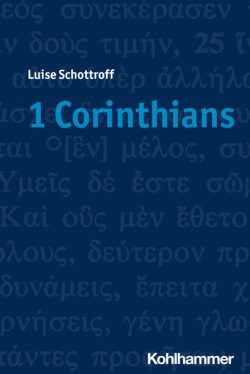Читать книгу 1 Corinthians - Luise Schottroff - Страница 9
На сайте Литреса книга снята с продажи.
3. Feminist Exegesis
ОглавлениеAlso in this field of investigation, Luise Schottroff is one of the women pioneers. Already in an essay in 1985, she raised the question, »How justified is feminist criticism of Paul?«7 and she analyzed therein a series of passages from his letters in which women are explicitly spoken about. She advocated interpreting these statements in the concrete context of each particular congregational situation, and to consider the history of interpretation separately (beginning with the Pastoral Epistles, continuing with the early church and up to the present). For treating Paul in the early phase of feminist theology, that was not self-evident. For, according to Schottroff, the history of discrimination against and oppression of women in Christianity is closely connected with the interpretation of the Pauline epistles. Many women have therefore rejected having anything to do with Paul, the »enemy of women,« for that would be »attempts to rescue oppressive texts incapable of being rescued.«8 This attitude also continues to be nourished in many popular interpretations of Paul, for the cliché of the authoritarian apostle, hostile to women and the body, battling against the Jewish law, holds on tenaciously to the present time. Summing the situation up in the year 1985, Luise Schottroff said: »Compared with the self-understanding of the male church and of male theology today, Paul was a feminist pioneer« (246). Since then much has fundamentally changed, not least thanks to feminist investigations and their reception in wider theological and ecclesiastical contexts. Scholarly feminist exegesis arrived at a more differentiated perspective on Pauline theology. In her overview of feminist research on Paul, Luzia Sutter Rehmann summarized that the interest has shifted: The issue is no longer presenting the suppressed history of women in the Pauline churches but a critical deconstruction of androcentric writings and a new sketch of Paul and his letters.9
Feminist theology was an essential center of gravity for Luise Schottroff in the research realm and in university political work, in which she was very involved for the advancement and networking of feminist theologians. Thus in 1986 she was involved in the establishment of the European Society of Women in Theological Research (ESWTR), an interreligious network for women theologians of all disciplines. In 1991 she co-published the Wörterbuch der Feministischen Theologie, which in 2002 underwent a thorough reworking and fundamental expansion. To the standard works in the German-speaking realm also belongs the Kompendium Feministische Bibelauslegung, which in 1998 was published by her and Marie-Theres Wacker. It offers a short commentary, with the focus on questions of relationships between the sexes, on all the biblical books, including the Apocrypha, and on selected extra-canonical writings. In 2012 it was published anew in an English translation under the title Feminist Biblical Interpretation. A Compendium of Critical Commentary on the Books of the Bible and Related Literature.
Feminist theology was for Luise Schottroff inextricably connected with liberation-theology oriented social history and questions of Jewish-Christian dialogue, which is shown in an exemplary way by her book Lydias ungeduldige Schwestern. Feministische Sozialgeschichte des frühen Christentums.10 [A year after its publication in German in 1994, the English translation appeared as Lydia’s Impatient Sisters. A Feminist Social History of Early Christianity. Louisville, Kentucky 1995; trans.] In the present commentary Luise Schottroff takes up her own interpretations from earlier times and changes them, in part fundamentally, as, for example, the interpretations of 1 Cor 11:2–16 or 1 Cor 14:34–38. From these examples it can be seen that she always took up current literature and always self-critically engaged with her own perspectives.
The three perspectives that marked the work of Luise Schottroff: social history, Christian-Jewish dialogue and feminist theology determine also the concept of the Bibel in gerechter Sprache (2006, 2011), of which she was one of the editors. Therein she is responsible for the translation of the Gospel of Matthew and also of the First Letter to the Congregation in Corinth, which she developed further in the present commentary and whose backgrounds she extensively developed.
I myself have worked together with Luise Schottroff for many years and discussed current projects. Thus I was able on a continuing basis to accompany the origin of this commentary, and I am especially happy, therefore, that it is now appearing in a second edition. Almost ready for the publisher is an English translation of the commentary, which will also enable its international reception. I deeply hope that in the long run the commentary will find women and men readers who will engage deeply with Luise Schottroff’s interpretations, which are careful, inspiring, often surprising, and always borne along by a deep spirituality, and that these readers will be inspired by her interpretation of Paul’s theology.
For their support in updating of commentary I thank Dr. Marlene Crüsemann and Prof. Dr. Carsten Jochum-Bortfeld.
Wuppertal, August 2020
Claudia Janssen
